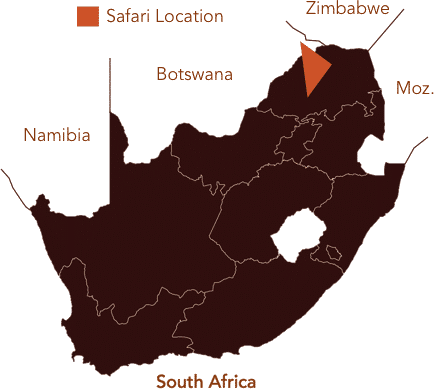Alexandra’s Africa Safaris
Conserving Wildlife, Art and Culture through Responsible Tourism
FAQs
Daily activities are determined by the resident ecologist and might vary daily. Activities will be one of the following:
-
Predator (Lion, Cheetah, Hyaena) Research
-
Camera Trap Setting (photography)
-
Game Counts
-
Vegetation Surveys
-
Reserve Work
-
Anti Poaching – this will not be dangerous, it is more informative – you will not be using firearms.
For more information on these – please request an EBrochure from us which has more information on each activity. If you click here – then scroll down to the little pink ‘request EBrochure button’.
You are welcome to enjoy any amount of time off if you would prefer this over a particular activity.
This does depend on the Safari you are on and the time of year and specific guidance will be given to you based on that .
The climate of South Africa more generally however is determined by South Africa’s situation between 22°S and 35°S, in the Southern Hemisphere’s subtropical zone, and its location between two oceans, Atlantic and the Indian. In the summer months (September to April), South Africa enjoys a lovely warm to hot, relatively arid climate – but it does cool down at night, especially in areas of high altitude.
This little app from holiday-weather.com is very useful:
https://www.holiday-weather.com/continent/africa/southern_africa
Yes mostly. Our eco camps are mostly off grid however, but it will be possible to charge your devices at a central station where electricity is drawn from a solar power source.
Yes – generally this is the case. We will tell you when that is not the case. We recommend you bring a re-usable water bottle – fill it up daily and keep it with you so that you stay hydrated all day.
Yes. Hot water is generally available at all times at our camps and lodges.
For South Africa there are four associated plug types, types C, D, M and N. Plug type C is the plug which has two round pins, plug type D is the plug which has three round pins in a triangular pattern and plug types M and N both have three round pins. South Africa operates on a 230V supply voltage and 50Hz.
For Botswana there are two associated plug types, types D and G. Plug type D is the plug which has three round pins in a triangular pattern and plug type G is the plug which has three rectangular pins in a triangular pattern. Botswana operates on a 230V supply voltage and 50Hz.
For Zimbabwe there are two associated plug types D and G. Plug type D has three round pins in a triangular pattern and plug type G is the plug which has three rectangular pins in a triangular pattern. Zimbabwe operates on a 240V supply voltage and 50Hz.
Adapter plugs are available for purchase at Johannesburg airport. We will ake time for this at the start of your Safari.

Yes. towels and linen are provided at all our camps/lodges. Guests are not required to bring their own.
Yes there are moderate facilities. You should put your laundry into the bag provided and it will be returned to you later that same day. A small fee will be charged.
Our Hosted Safari locations (the Classic 10 and the Explorer 12) are situated mainly in the vast, drier, northerly region of Limpopo Province in South Africa. Our Explorer 12 Hosted Safari extends further north into the southern region of Botswana. The map below illustrates our Hosted Safari range. Our slightly shorter Safaris for Women are offered in Namaqualand, in the southern Cape, and also in the Limpopo region of South Africa.
Our Tailored Safaris operate anywhere in Southern Africa based on the choice of our guests. The most popular regions to visit are the Victoria Falls in Zimbabwe and the Chobe and Okavango regions of Botswana.
Guests often add a few days at the start or at the end of their Safari in the beautiful Cape region of South Africa.

Our local teams have plenty of guide books – but if you would like your own safari reference books or to review in advance – we find the following pocket guides and reference books useful as they are light and easy to carry:
On Birds:
Birds of Southern Africa (Pocket Guide) by Ian Sinclair or similar version by Burger Cillie – both are good:
Click here for a link to the Ian Sinclair book on Amazon.co.uk
Click here for a link to the Burger Cillie book on Amazon.co.uk
On Mammals:
Mammals of Southern Africa (Pocket Guide) by Chris & Mathilde Stuart – or the similar one by Burger Cillie – both are good:
Click here for a link to the Chris & Mathilde Stuart book on Amazon.co.uk
Click here for a link to the Burger Cillie book on Amazon.co.uk
On Stargazing:
Stargazing: From Game Reserves in Southern Africa by Anthony Fairall
Click here for the link on Amazon.co.uk
Running a safe Safari is vital, and is why we have chosen our area of operation. The areas we operate in are very safe. The safaris are hosted and you will be with your host and guides throughout. Our Tailored Safaris are not hosted, but we will only recommend areas that we know are safe to visit, and for all transfers and activities, you will be with experienced guides. That said, all the normal precautions that one should take when travelling to any location in the world should be adhered to. We provide all the necessary guidance in our pre-Safari checklists.
Yes our Tailored Safaris are perfect for children over the age of 4 – and they are wonderful opportunities for shared learning. But please note that some of our accommodation has unprotected raised platforms, and swimming pools are unfenced and unsupervised.
Please note however that there are not many activities for children, and quiet patience is often required, whilst observing wildlife in nature. There is also limited WiFi.
Parents travelling with children must carry an unabridged birth certificate for each child, for entry into South Africa at Johannesburg’s O.R. Tambo Airport.
We provide our guests with a detailed ‘pre-safari’ check list that lists everything that will be required on the Safari, that is not already provided.
Please contact us if you would like us to send you a checklist – whether you are travelling with Alexandra’s Africa or not. We would be delighted to assist!
There is a lower limit – we cannot take children under the age of 4 years of age.
The is NO upper age limit! The only guidance we offer on this is: (1) the traveller must be eligible for personal travel insurance, and (2) as we are often driving in open, off-road 4-wheel drive vehicles, it can get a little bumpy at times, and our guests need to be able to climb in and out of a game vehicle (our game rangers are always on hand to assist).
Last year we had a number of guests of 80+ years of age wonderful!
Our group sizes on our Safaris and Retreats are as follows:
- On our Hosted Safaris and Conservation Experience Safaris we are able to take up to 8 guests per Safari.
- On our Tailored Safaris – we can take any size – this is entirely dependent on the guests.
- On our Safaris for Women – our groups range from 8 to 12 people


